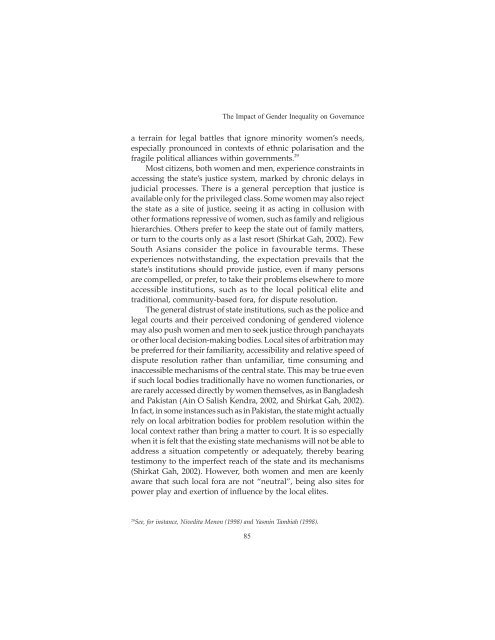Essays On Gender And Governance - United Nations Development ...
Essays On Gender And Governance - United Nations Development ...
Essays On Gender And Governance - United Nations Development ...
Create successful ePaper yourself
Turn your PDF publications into a flip-book with our unique Google optimized e-Paper software.
The Impact of <strong>Gender</strong> Inequality on <strong>Governance</strong><br />
a terrain for legal battles that ignore minority women’s needs,<br />
especially pronounced in contexts of ethnic polarisation and the<br />
fragile political alliances within governments. 29<br />
Most citizens, both women and men, experience constraints in<br />
accessing the state’s justice system, marked by chronic delays in<br />
judicial processes. There is a general perception that justice is<br />
available only for the privileged class. Some women may also reject<br />
the state as a site of justice, seeing it as acting in collusion with<br />
other formations repressive of women, such as family and religious<br />
hierarchies. Others prefer to keep the state out of family matters,<br />
or turn to the courts only as a last resort (Shirkat Gah, 2002). Few<br />
South Asians consider the police in favourable terms. These<br />
experiences notwithstanding, the expectation prevails that the<br />
state’s institutions should provide justice, even if many persons<br />
are compelled, or prefer, to take their problems elsewhere to more<br />
accessible institutions, such as to the local political elite and<br />
traditional, community-based fora, for dispute resolution.<br />
The general distrust of state institutions, such as the police and<br />
legal courts and their perceived condoning of gendered violence<br />
may also push women and men to seek justice through panchayats<br />
or other local decision-making bodies. Local sites of arbitration may<br />
be preferred for their familiarity, accessibility and relative speed of<br />
dispute resolution rather than unfamiliar, time consuming and<br />
inaccessible mechanisms of the central state. This may be true even<br />
if such local bodies traditionally have no women functionaries, or<br />
are rarely accessed directly by women themselves, as in Bangladesh<br />
and Pakistan (Ain O Salish Kendra, 2002, and Shirkat Gah, 2002).<br />
In fact, in some instances such as in Pakistan, the state might actually<br />
rely on local arbitration bodies for problem resolution within the<br />
local context rather than bring a matter to court. It is so especially<br />
when it is felt that the existing state mechanisms will not be able to<br />
address a situation competently or adequately, thereby bearing<br />
testimony to the imperfect reach of the state and its mechanisms<br />
(Shirkat Gah, 2002). However, both women and men are keenly<br />
aware that such local fora are not “neutral”, being also sites for<br />
power play and exertion of influence by the local elites.<br />
29<br />
See, for instance, Nivedita Menon (1998) and Yasmin Tambiah (1998).<br />
85

















